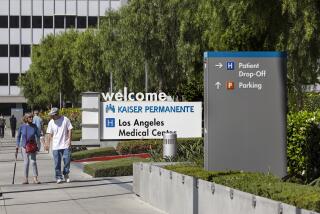How About a Brochure on Stay-at-Home Childbirth? They Could Throw in a Coupon
- Share via
So Kaiser discharges newborns and new moms just eight hours after a normal birth (“Early-Release Policy at HMOs Draws Fire,” June 16). Maybe hospital stays could be shortened further by offering a stay-at-home-birthing brochure on managing your own delivery. Perhaps families would get a bit of a break on the next month’s premium by omitting altogether the hospital system from things of an obstetrical nature.
Making profit in dollars more important than guarding the well-being of our most vulnerable population is a disgrace. And who could be more vulnerable than new parents and their helpless infants?
For the record:
12:00 a.m. July 2, 1995 For the Record
Los Angeles Times Sunday July 2, 1995 Home Edition Business Part D Page 4 Financial Desk 2 inches; 41 words Type of Material: Correction
Error in letter--A word was inadvertently dropped in a letter to the editor from Nancy G. Zajac last Sunday. The last sentence should have read: “It is not unrealistic for insurers to try to hold down expenses related to voluntarily incurred conditions that are not necessary for life or health.”
JUANITA L. SMATHERS, R.N.
Playa del Rey
*
Assemblywoman Liz Figueroa (D-Fremont) is quoted as saying that “there is no room for putting profits before the concerns of a healthy society.”
Figueroa may not be aware that Kaiser is a nonprofit HMO that reinvests its “profits” in better health care, unlike FHP International, PacifiCare Health Systems Inc., Takecare Inc., Foundation Health Corp., etc. The latter HMOs are traded on the stock market and distribute millions of dollars to shareholders, mostly collected from our tax-paid Medicare.
I have yet to see a discussion of for-profit HMOs’ impact on our exploding health costs. We are the only country where stockholders make money on patients.
G. BORDING MATHIEU
Laguna Beach
*
As Kaiser Permanente reminds us, “childbirth is a natural event.” Let us remember that the occurrence of death of the mother or baby during or after childbirth is also a natural event, lessened only by the intervention of modern medicine in civilized countries.
In other civilized countries and until recently in the United States, five-day stays in the hospital following normal childbirth are routine. Is this practice merely a scheme by which doctors, nurses and their patients rob health insurers of their profits?
It is unfortunate that in this civilized country, we are letting our health care decisions be driven by greed and profits rather than the wisdom of modern medicine.
JEAN McARTHUR LEWIS
San Diego
*
When I had my first baby in England, a nurse visited my home to make sure I provided a safe environment for the newborn child. She returned after I gave birth to evaluate my baby and me, including problems with my hypertension, urinary tract infection, breast-feeding and child care.
When I had my second child, at Kaiser, I received no evaluation of my home, training in breast-feeding or subsequent nurse evaluations of my health or my child’s after a 24-hour discharge. The baby did not breast-feed well and became dehydrated and jaundiced and required a week of inpatient care.
I am a nurse. If I had problems evaluating and treating my own child, I can only imagine the danger of complications many women face when they are literally abandoned by the medical system a few hours after they give birth.
LAUREL BRODSLEY
Studio City
*
Critics of HMO and insurance company policies to discharge new mothers and babies from the hospital soon after normal, uncomplicated delivery are overlooking how fortunate the women are just to have maternity coverage under their insurance.
Insurance is intended to provide protection against losses from involuntary and undesirable events. As such, maternity coverage is an aberrant use of insurance.
Pregnancy is one of the extremely few--and possibly the only--voluntary events that is routinely covered by insurance. It is not unrealistic for insurers to try to hold down expenses related to voluntarily incurred conditions that are necessary for life or health.
NANCY G. ZAJAC
Encino
More to Read
Inside the business of entertainment
The Wide Shot brings you news, analysis and insights on everything from streaming wars to production — and what it all means for the future.
You may occasionally receive promotional content from the Los Angeles Times.








